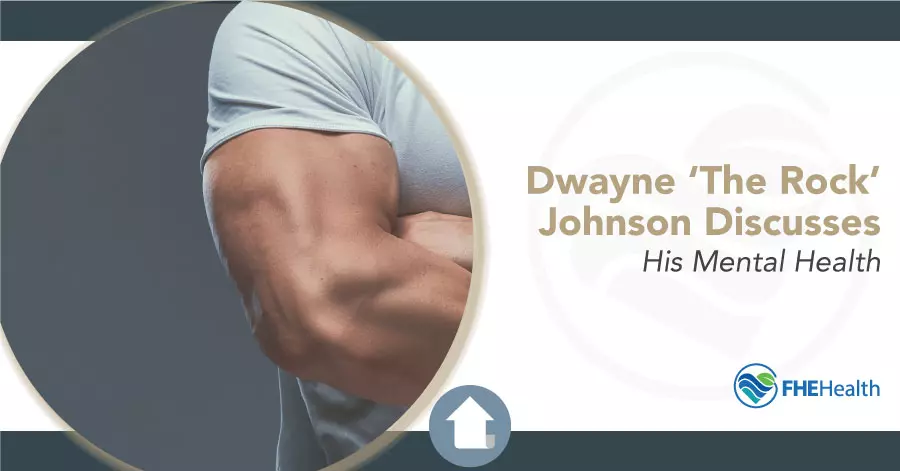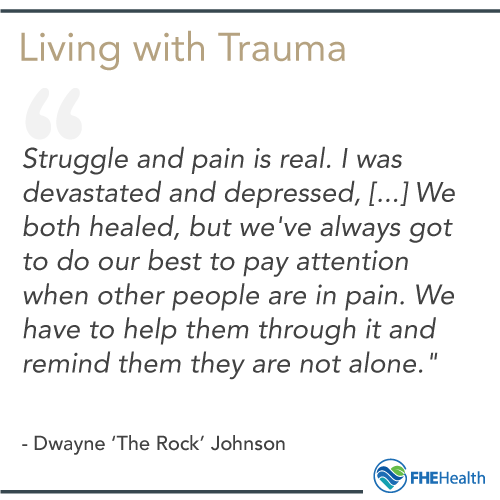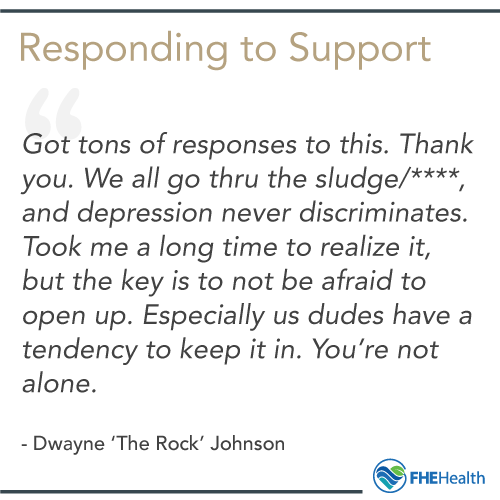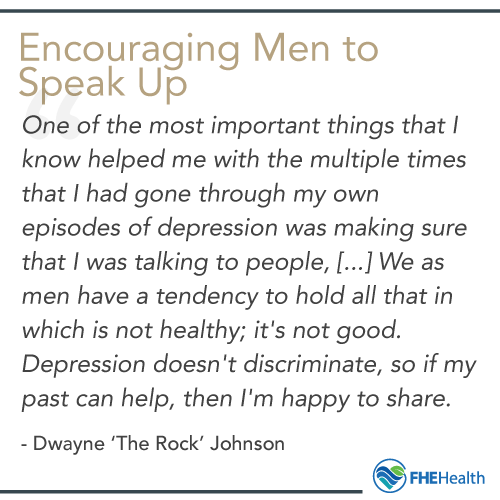
As social media continues to grow, so do the ways in which celebrities can make connections with fans. Lives that were previously largely lived in magazines and TV programs are now broadcast for the world to see, letting regular people experience a sneak peek into the lives of the rich and famous. In doing this, celebrities are also provided a platform in which to speak about the things that matter. And, as mental health is becoming increasingly destigmatized, more and more celebrities are speaking about their own challenges and experiences.
For those living with mental health issues, isolation is a common feeling. Hearing celebrities like Dwayne Johnson, also known as “The Rock,” talk about what they have experienced can improve personal perceptions, helping those of all ages and walks of life to understand that they are not alone.
Who Is Dwayne Johnson?
 Dwayne Johnson, colloquially called “The Rock,” is an actor, producer and former professional athlete. Born in Hayward, California, Johnson moved around frequently as a child, with homes in California, New Zealand, Connecticut, Pennsylvania and Hawaii. Before the age of 17, he was arrested numerous times for fighting, theft and check fraud, something he attributes to his stressful early life. However, he soon diverted this energy into athletics and fitness training — two factors that greatly influenced who he is today.
Dwayne Johnson, colloquially called “The Rock,” is an actor, producer and former professional athlete. Born in Hayward, California, Johnson moved around frequently as a child, with homes in California, New Zealand, Connecticut, Pennsylvania and Hawaii. Before the age of 17, he was arrested numerous times for fighting, theft and check fraud, something he attributes to his stressful early life. However, he soon diverted this energy into athletics and fitness training — two factors that greatly influenced who he is today.
In high school, Johnson began playing football, running track and wrestling. He played college football for the University of Miami with aspirations of going pro, but he was unsuccessful in the 1995 NFL draft, in large part due to his many injuries. He also attempted placement with the Canadian Football League but was cut from the roster after several months.
With football little more than a pipe dream, Johnson switched his focus to wrestling — a far more successful venture. In 1996, he signed a contract with the World Wrestling Federation. He started his career under the moniker Rocky Maivia and was soon given the ring name “The Blue Chipper.” After audience backlash toward results of his earlier fights, he dropped Rocky Maivia in favor of a shorter iteration: “The Rock.” What followed was a highly successful career complete with many titles and belts that came to a close in 2004 when Johnson switched his focus to acting. He has since made numerous re-appearances in wrestling for special occasions and events.
Johnson’s acting career coincided with his wrestling career; he landed his first television role in 1999 and his first film role in 2001. He has since been in dozens of films, with feature roles in the Fast & Furious franchise, among many others. He is very active in the film world today with numerous movies set to debut in 2020 and beyond.
Dwayne Johnson’s Mental Health Challenges
 No one is immune from mental illness, and that includes celebrities like The Rock. After years of silence, Johnson has recently opened up about his troubles with anxiety and depression. In recent interviews, he has spoken quite candidly about his personal journey, including the elements of his life that permanently changed him and his mental state.
No one is immune from mental illness, and that includes celebrities like The Rock. After years of silence, Johnson has recently opened up about his troubles with anxiety and depression. In recent interviews, he has spoken quite candidly about his personal journey, including the elements of his life that permanently changed him and his mental state.
When Johnson was 15, his mother attempted suicide by walking into traffic following a series of upsetting life events, including a recent eviction. His mother has no memory of the event, but the trauma remains with Johnson to this day. “Struggle and pain is real. I was devastated and depressed,” he says of the incident. “We both healed, but we’ve always got to do our best to pay attention when other people are in pain. We have to help them through it and remind them they are not alone.”
He also cites his injuries playing college football that eventually ended his NFL dreams and a breakup with a serious girlfriend that coincided with his struggles in the CFL. “I reached a point where I didn’t want to do a thing or go anywhere,” Johnson said of his depression following these tough times. “I was crying constantly.”
Mental Health and Masculinity
 Putting oneself out there is never easy, and it wasn’t easy for Johnson, either. He cites an experience he had with a friend who was fighting his own battle with depression. When Johnson let him know that this is not a unique phenomenon and saw how much his message meant, he realized it was important for him to share his story with others as well.
Putting oneself out there is never easy, and it wasn’t easy for Johnson, either. He cites an experience he had with a friend who was fighting his own battle with depression. When Johnson let him know that this is not a unique phenomenon and saw how much his message meant, he realized it was important for him to share his story with others as well.
On his Twitter account, he shared an article documenting his struggle and posted the following in response to the response he received from his fans:
“Got tons of responses to this. Thank you. We all go thru the sludge/shit, and depression never discriminates. Took me a long time to realize it, but the key is to not be afraid to open up. Especially us dudes have a tendency to keep it in. You’re not alone.”
Johnson has received significant acclaim for his reference to the role of masculinity in staying silent on mental health issues. Men face many challenges in openly talking about mental health, in large part due to the perceptions of masculinity in American culture. Men are often taught from a young age that admitting to things like anxiety and depression means showing weakness. They are taught that men can control their feelings and that asking for help isn’t something men need to do. By talking about his own problems, Johnson is able to show young men that this isn’t true: men do experience anxiety and depression, and it’s okay to talk about it and to ask for help.
“One of the most important things that I know helped me with the multiple times that I had gone through my own episodes of depression was making sure that I was talking to people,” he said about his coping mechanisms when dealing with his depression. “We as men have a tendency to hold all that in which is not healthy; it’s not good. Depression doesn’t discriminate, so if my past can help, then I’m happy to share.”
The Importance of Getting Help
With 40 million American adults living with depression, celebrity stories like Johnson’s can have a huge impact on how people choose to deal with what is facing them. By listening to The Rock talking about mental health, those suffering in silence may feel a little less alone — and a little more likely to seek treatment.
If you or someone you love is living with depression, the time to seek help is now. At FHE Health, we offer a comprehensive step-down approach to treatment for mental health issues to ensure the best possible chance at recovery. Please contact us today to learn more about what we have to offer.






